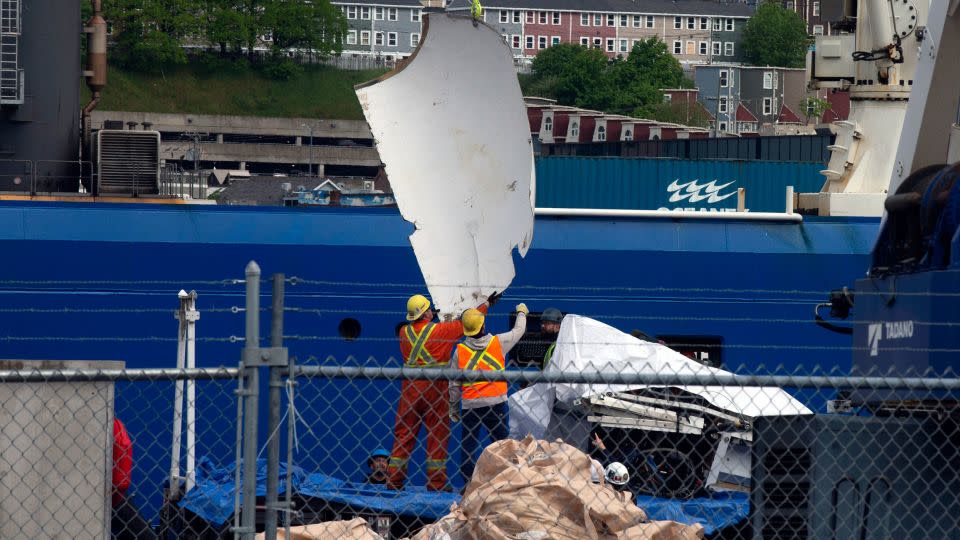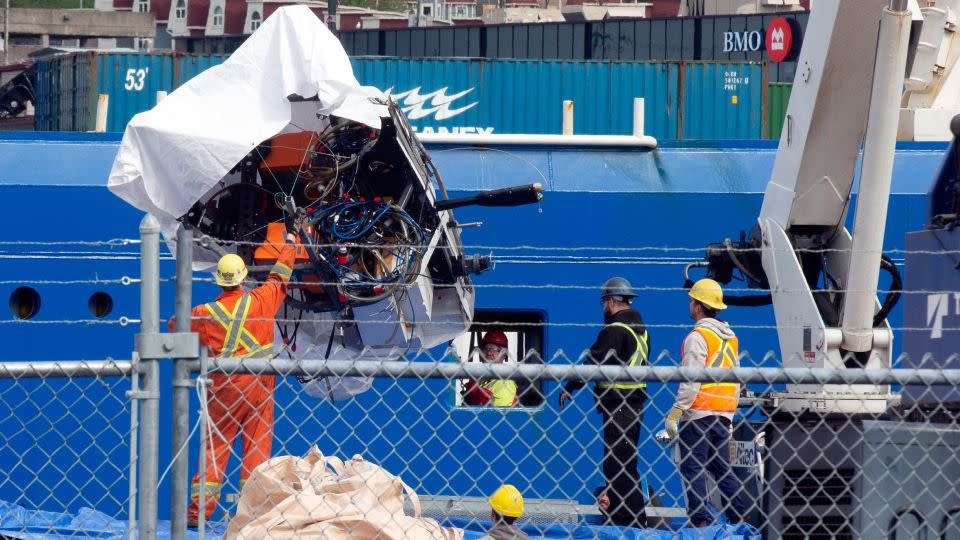‘Presumed human remains’ from the Titan submersible wreck will be analyzed as investigators try to unravel how the disaster unfolded
US medical experts will analyze “presumed human remains” found within the Titan submersible’s wreckage as mystery still surrounds the vessel’s catastrophic implosion last week in the North Atlantic.
“There is still a substantial amount of work to be done to understand the factors that led to the catastrophic loss of the TITAN and help ensure a similar tragedy does not occur again,” US Coast Guard Capt. Jason Neubauer said in a statement Wednesday, nearly a week after the calamity was confirmed.
The OceanGate Expeditions submersible – which hosted $250,000-a-ticket tourist excursions to the 111-year-old remains of the Titanic – lost contact June 18 with its mother ship, the Polar Prince. The Titan’s failure to resurface sparked a massive, international search – from the ocean’s swelling surface to its cold, blind depths – that captured the world’s attention for days.
The arduous hunt ended when US authorities delivered the most tragic news: The submersible had imploded, and all five men onboard had presumably died.
The US Coast Guard has convened a Marine Board of Investigation – its highest level of inquiry – to examine what caused the tragedy and offer possible recommendations “to the proper authorities to pursue civil or criminal sanctions as necessary,” said Neubauer, who heads the board and leads the team investigating the Titan disaster.
Investigators will analyze debris from the vessel’s wreckage, collect evidence, interview witnesses and hold a public hearing for more witness testimony.

Meanwhile, evidence from the Titan wreckage site has arrived in the Canadian coastal city of St. John’s, Newfoundland and Labrador, the US Coast Guard said Wednesday. The Transportation Safety Board of Canada confirmed its arrival and that the US Coast Guard had it.
The evidence – including the presumed human remains – will be taken to a US port for analysis and testing, the Coast Guard said. “The evidence will provide investigators from several international jurisdictions with critical insights into the cause of this tragedy,” Neubauer said Wednesday.
A white panel-like piece – taller than the two men guiding it onto land – and another similarly sized part with cords and wires draped with white tarp were taken off the anchor handling vessel Horizon Arctic on Wednesday at the Canadian Coast Guard pier in St. John’s, photos by The Canadian Press’ Paul Daly show. It was not immediately clear what those pieces were.
The company that owns the remotely operated vehicles that brought Titan’s remains to the surface, Pelagic Research Services, for now has “successfully completed” its offshore work, it told CNN.
The Canadian safety board is conducting its own safety investigation into the operation of the Polar Prince, which the board called a “Canadian-flagged cargo vessel.”
Those investigators have collected all documents and conducted preliminary interviews with those aboard the Polar Prince, the agency said. They have also sent the vessel’s voyage data recorder, which stores audio from the ship’s bridge, to an Ottawa laboratory for analysis.
The Transportation Safety Board of Canada “will continue to cooperate with the United States, United Kingdom, and France, in accordance with international agreements, as they are ‘substantially interested states’ under the International Maritime Organization Casualty Investigation Code,” it said.
The Royal Canadian Mounted Police is also investigating and looking into whether “criminal, federal, or provincial laws may possibly have been broken.”

Mourning the 5 men lost
While investigators hunt for answers, friends and relatives of the five men on board are overcome with grief.
Pakastani businessman Shahzada Dawood and his son, Suleman Dawood; British businessman Hamish Harding; French diver Paul-Henri Nargeolet; and Stockton Rush, the OceanGate CEO, were all on board.
Christine Dawood, the wife of 48-year-old Shahzada and mother of 19-year-old Suleman, had intended to take part of the expedition but decided to step aside so her son could go instead, she’s said.
“They really, really wanted to do that for a very long time,” she told the BBC.
Her son was a Rubik’s Cube obsessive who took the puzzle block – which he could solve in 12 seconds – with him on the Titan, where he’d planned to solve it “3,700 meters below sea at the Titanic,” she recalled him saying.
Harding, a 58-year-old British businessman, had been part of other extreme expeditions, including as a member of the flight crew that broke the world record for the fastest circumnavigation of the globe via both poles. In 2020, he became one of the first people to dive to Challenger Deep in the Pacific Ocean, widely believed to be the deepest point in the world’s oceans.
“He was a passionate explorer-whatever the terrain-who lived his life for his family, his business and for the next adventure,” said a statement on behalf of his family released by Dubai-based Action Aviation, which Harding owned.
Nargeolet, a 77-year-old French diver, was a former commander who served in the French navy for 25 years. He had decades of experience exploring the Titanic and served as the director of underwater research at RMS Titanic Inc., the company that has exclusive rights to salvage artifacts from the ship.
“When you think of the Titanic and all we know about the ship today, you will think of Paul-Henri Nargeolet and his legendary work,” his family said in a statement. “But what we will remember him most for is his big heart, his incredible sense of humor and how much he loved his family.”
Rush, 61, founded OceanGate in 2009, with a stated mission of “increasing access to the deep ocean through innovation.”
Throughout his life, he cultivated a reputation as a nature lover, an adventurer and a visionary and was described by OceanGate as a true explorer with a “distinct spirit of adventure.”
CNN’s Paul P. Murphy, Paula Newton and Michelle Krupa contributed to this report.
For more CNN news and newsletters create an account at CNN.com

